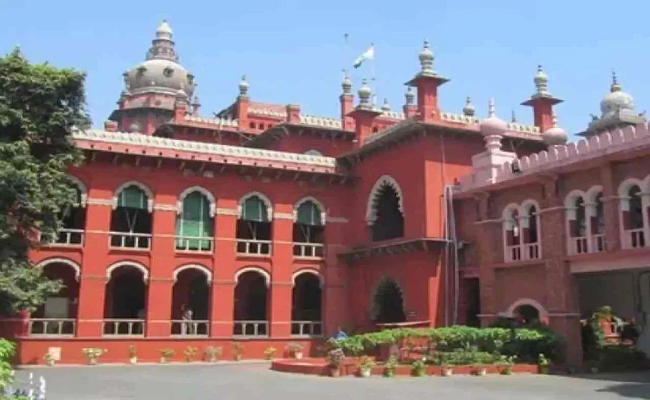Congress complaint leads to EC directive: "BJP's video targeting muslims to be removed"
.gif)
.gif)
The Madras High Court on Thursday held that a child who is provided free and compulsory education under the Right of Children to Free and Compulsory Education Act
The student admitted under EWS is not liable to pay any fees, payments or expenses and it is the duty of the state to bear all expenses incurred by the child in connection with his education
The minor boy had paid fees of Rs.5,340 and 6,437 for the academic year 2017-2018 and 2018-2019 as demanded by the school

The Madras High Court on Thursday held that a child who is provided free and compulsory education under the Right of Children to Free and Compulsory Education Act is not liable to pay any fees, payments or expenses and it is the duty of the state to bear all expenses incurred by the child in connection with his education.
The High Court was hearing a plea by the father of a minor boy who was admitted to a private unaided matriculation school under the provisions of the Children's Right to Free and Compulsory Education Act in Vellore district and was not given uniform, books and notes despite the order of the district magistrate, while other students were not admitted under the Economically Weaker Section (EWS) quotas have been given all they need.
The minor boy paid fees of Rs 5,340 and Rs 6,437 for the academic year 2017-2018 and 2018-2019 respectively as demanded by the school. However, he was asked to pay an amount of Rs 11,977 as a fee for the academic year 2019-2020 for uniforms and study materials, including textbooks and stationery. Since the boy could not pay the amount, the school did not provide him with uniform, books and notes. The question before Justice M Dhandapani was whether the fees for uniforms, exercise books and study materials are refundable in respect of a child who is admitted to a school under the 25 per cent quota.
"The state's duty is to provide free and compulsory education to the children listed in § 2 letter d) and e) of the Act in such a way that all the fees that would be payable for the child are absorbed on his head and it is not for the child who is admitted within the above mentioned quota to pay even a cent to educate himself, because according to The Directive Principles of State Policy is a binding obligation of the state to provide free and compulsory education to the children of weaker sections and disadvantaged groups. as enumerated in the Constitution but under Section 12(2) of the Act,” Justice M Dhandapani said.
The High Court rejected the state government's contention that there was no express provision under the law ordering the state to bear all the costs associated with a child's compulsory schooling. The state argued that under the law, the state government is mandated to reimburse only tuition fees for providing education to students from weaker sections of the society.
The Supreme Court said that it is the duty of the state in coordination with the central government to share the expenditure to ensure compulsory education of children from weaker sections of society and disadvantaged groups. The state cannot additionally claim after the law comes into effect that only school fees are returned and other fees are not charged to the head of state, the high court added.
The Supreme Court further stated that ensuring compulsory education by admitting a student through setting a quota under the law is not only within the scope of reimbursement of school fees. The Supreme Court said that a child's education is not limited to attending the classroom, but education is a continuous process that the child takes home through the works given to the child by the teachers to enrich his understanding skills. The High Court added that the learning of a child at home requires the help of exercise books and textbooks and other study materials which would fall within the field of learning aids which are just and necessary for every child to enrich his knowledge.
“If the Court is to accept the contention of the learned Additional Solicitor General that the compensation by the State is only to the extent of tuition fee itself, the only conclusion that can be drawn from it is that it not only undermines the provisions of the Act but in fact frustrates many provisions of the Act and the benevolent nature of the Act pales into insignificance,” the high court said and directed the respondents to provide all materials including uniforms, notebooks, textbooks and all other reading materials to the minor boy.